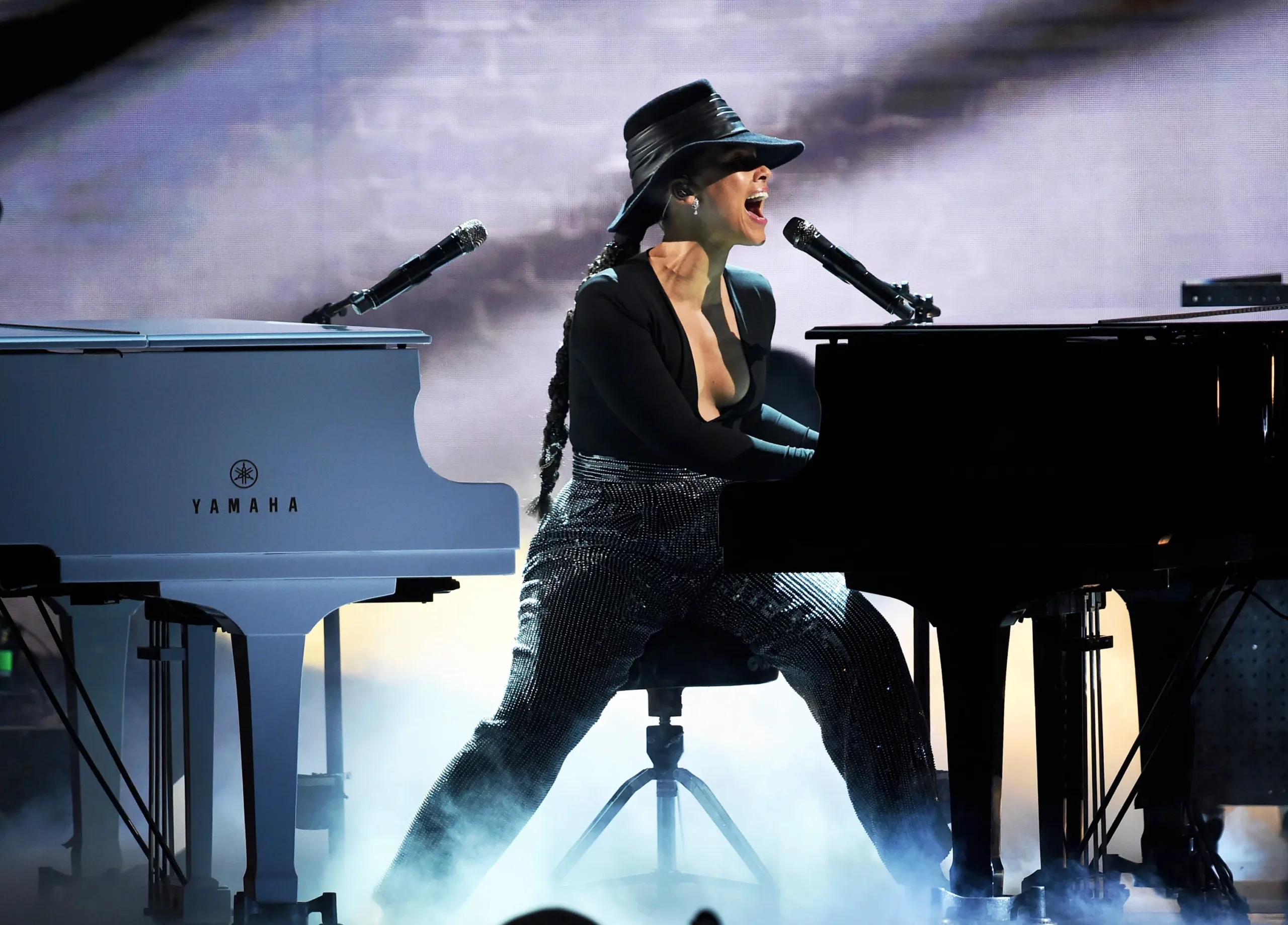Alicia Keys’ relationship with the piano is integral to her artistry, having started formal training at just seven years old. Her mastery of the instrument is evident in her performances, where she seamlessly blends her vocals with intricate melodies. The piano isn’t merely an accessory; it’s a crucial part of her musical expression and connection with fans. However, one might wonder how her early training shaped her unique sound and the impact it’s had on contemporary music. The answers reveal much about her evolution as an artist.
Alicia Keys’ Musical Background
Alicia Keys’ musical background is marked by an impressive fusion of influences that shaped her unique sound. Growing up in New York City, she absorbed a diverse array of genres, including classical, jazz, R&B, and hip-hop. These eclectic elements coalesced to create her distinct style, characterized by soulful melodies and thought-provoking lyrics.
Her upbringing in a household filled with music further solidified her passion; her mother, a single parent, introduced her to various artists, which sparked Alicia’s curiosity and creativity.
Keys’ early exposure to music wasn’t limited to just listening; she actively participated in her environment. She attended the Professional Performing Arts School, where she honed her skills and developed a deep appreciation for songwriting.
Influences from artists like Stevie Wonder, Nina Simone, and Prince enriched her musical palette, enabling her to blend traditional and contemporary sounds seamlessly. This combination of classical training and contemporary influences fostered her ability to convey profound emotions through her music.
As a result, Alicia Keys emerged as a powerful force in the industry, consistently pushing boundaries and redefining what it means to be a multifaceted musician.
Early Piano Training
At the age of seven, Alicia Keys began her formal piano training, setting the stage for her future as a renowned musician. Her mother recognized Alicia’s prodigious talent early on and enrolled her in classical piano lessons. Under the guidance of skilled instructors, Alicia quickly grasped the fundamentals of music theory and composition, immersing herself in the world of classical music.
This structured training not only honed her technical skills but also provided her with a solid foundation for her artistic expression.
Alicia’s dedication to practice was evident as she spent countless hours at the piano, developing an impressive repertoire. She explored various genres, from classical to jazz, which enriched her musical vocabulary and influenced her later work. The rigorous training instilled in her a deep appreciation for melody and harmony, elements that would become hallmarks of her songwriting.
Additionally, Alicia’s early experiences with performance further shaped her stage presence and confidence. By participating in recitals and competitions, she learned the importance of connecting with an audience, a skill that would serve her well in her illustrious career.
Ultimately, her early piano training laid the groundwork for her multifaceted artistry.
Signature Piano Style
Keys’ signature piano style seamlessly blends classical training with contemporary influences, creating a unique sound that resonates with audiences around the world. Her approach to the piano showcases a mastery of both technique and emotion, where intricate melodies intertwine with rich harmonies. This fusion allows her to traverse a wide array of genres, from soul and R&B to pop and jazz.
One distinctive aspect of Keys’ playing is her use of dynamic contrasts. She often shifts between delicate, soft passages and powerful, driving chord progressions, which adds depth and drama to her performances. Her left hand frequently anchors the music with rhythmic bass lines, while her right hand crafts soaring melodies, resulting in a mesmerizing interplay.
Moreover, Keys’ improvisational skills shine through in live settings, where she often alters arrangements on the fly, keeping her performances fresh and engaging. This spontaneity reflects her deep emotional connection to the music, drawing listeners in and inviting them to experience each piece anew.
Role of Piano in Her Music
In Alicia Keys’ music, the piano serves as a fundamental element that shapes her signature sound and enhances her emotional expression.
Its presence not only elevates her live performances, enchanting audiences, but also plays a vital role in her songwriting and composition process.
Signature Sound Creation
Blending classical training with contemporary influences, Alicia Keys masterfully employs the piano as a cornerstone of her musical identity. Her signature sound emerges from a seamless integration of rich harmonies and intricate melodies, often showcasing her virtuosity. The piano serves not just as an instrument but as a vehicle for emotional expression, allowing listeners to connect deeply with her lyrics and themes.
Keys often utilizes the piano to create a lush, soulful backdrop that complements her powerful vocals. This interplay highlights her ability to convey complex emotions, whether through the soaring crescendos of “Fallin'” or the intimate balladry of “If I Ain’t Got You.” Her songwriting reflects a keen understanding of dynamics, as she varies intensity to enhance the narrative arc of each song.
Moreover, the piano’s versatility enables her to traverse genres, blending R&B, pop, and classical elements. This fusion not only defines her unique sound but also sets her apart in the music industry.
Live Performances Impact
The role of the piano in Alicia Keys’ live performances elevates her artistry to new heights, transforming each concert into an immersive experience. Keys’ skillful playing establishes a deep emotional connection with her audience, allowing them to feel the nuances of her music. The piano serves not only as an instrument but as a central character in her storytelling, enhancing both lyrical themes and melodies.
During her performances, Keys often opts for stripped-down arrangements, showcasing her piano skills while emphasizing her powerful vocals. This approach creates an intimate atmosphere, drawing listeners into her world. Songs like “Fallin'” and “If I Ain’t Got You” resonate profoundly, as the piano’s rich harmonies complement her expressive delivery.
Furthermore, her improvisational style on the piano keeps fans on their toes, making each performance unique. This unpredictability adds an element of excitement and authenticity, reinforcing her reputation as a consummate artist.
Fundamentally, the piano not only supports her music but also acts as a crucial conduit for emotional expression, solidifying Alicia Keys’ place as a standout performer in contemporary music.

Songwriting and Composition Role
While crafting her songs, Alicia Keys harnesses the piano as a fundamental tool that shapes her musical identity and compositional style. The instrument’s rich tones and versatility allow her to explore various genres, from R&B to classical influences. Keys often begins her songwriting process at the piano, using its keys to inspire melodies and harmonies that resonate emotionally with her audience.
In her compositions, the piano acts as both a rhythmic and melodic foundation, enabling her to weave intricate narratives through her lyrics. Tracks like “Fallin'” and “If I Ain’t Got You” showcase her ability to blend powerful vocal performances with evocative piano arrangements, driving home the emotional weight of her messages. The piano’s presence in her music not only highlights her technical prowess but also reinforces her authenticity as an artist.
Moreover, her use of improvisation at the piano often leads to spontaneous creative breakthroughs, adding a layer of organic expression to her work. This synergy between piano and songwriting solidifies Alicia Keys’ reputation as a masterful composer, ensuring her music remains impactful and timeless.
Through her artistry, she demonstrates the profound connection between the piano and her musical vision.
Live Performances and Piano Skills
Alicia Keys captivates audiences with her powerful live performances, seamlessly weaving her exceptional piano skills into each song. Her ability to blend emotive vocals with intricate piano melodies creates an immersive experience that resonates deeply with fans. Keys isn’t just a singer; she’s a skilled pianist whose technique enhances her artistry.
During live shows, she often opts for minimalistic arrangements, allowing her piano playing to take center stage. This choice emphasizes her musicality, showcasing her ability to evoke emotion through each keystroke. Whether she’s performing a heartfelt ballad or an upbeat anthem, her piano skills provide a foundation that supports her vocal prowess.
Moreover, Keys frequently improvises during performances, adding a layer of spontaneity that keeps her sets fresh and engaging. This improvisation highlights her deep connection to the instrument and her spontaneous creativity. Each performance becomes a unique experience, as she navigates the piano with both precision and flair.
Ultimately, Alicia Keys’ live performances serve as a demonstration of her dedication to the craft, showcasing her ability to blend technical skill with emotional depth, making her a standout artist in the music industry.
Impact on Popular Music
Alicia Keys has greatly influenced popular music by skillfully blending genres like R&B, soul, and classical, creating a unique sound that resonates with diverse audiences.
Her success as a pianist and vocalist not only showcases her artistic versatility but also empowers female musicians to break boundaries in a male-dominated industry.
Through her work, Keys inspires a new generation of artists to embrace their individuality and explore genre fusions.
Fusion of Genres
Blending various musical styles, Alicia Keys has considerably influenced the landscape of popular music through her innovative fusion of genres. By seamlessly incorporating elements of R&B, soul, jazz, and even classical music, Keys has created a distinctive sound that resonates with a wide audience. Her ability to merge these styles not only showcases her versatility as an artist but also broadens the scope of what popular music can encompass.
Keys’ signature piano-driven ballads often feature intricate harmonies and rich melodies reminiscent of jazz, while her rhythmic elements draw heavily from hip-hop and R&B. This fusion allows her to appeal to diverse listener demographics, paving the way for a new generation of artists to explore genre-blending. Tracks like “Fallin'” and “If I Ain’t Got You” exemplify how her unique sound can evoke deep emotional responses, transcending traditional genre boundaries.
Moreover, Keys’ work encourages collaborations across genres, fostering an environment where artists feel free to experiment. As a result, her impact on the music industry extends beyond her own recordings, inspiring emerging musicians to incorporate diverse influences into their own artistry.
In this way, Alicia Keys continues to redefine the essence of popular music.
Empowering Female Musicians
The rise of Alicia Keys has considerably empowered female musicians, reshaping the landscape of popular music and inspiring countless women to pursue their artistic ambitions. With her soulful voice and piano prowess, Keys has demonstrated that women can be multifaceted artists, seamlessly blending songwriting, performance, and instrumental talent. This unique combination has challenged traditional gender roles in the music industry, fostering a new generation of female artists who feel encouraged to explore their creativity without limits.
Keys’ success hasn’t only amplified the presence of women in popular music but also cultivated a sense of community among female musicians. By collaborating with and uplifting other artists, she’s sparked discussions about representation and equity within the industry. Her advocacy for women’s rights, mental health, and social justice further emphasizes the importance of female voices in shaping cultural narratives.
Moreover, Alicia Keys’ authenticity and vulnerability resonate with audiences, proving that emotional depth can coexist with commercial success. As she continues to break barriers, her impact extends far beyond her own career; she paves the way for aspiring female musicians to dream big and redefine what it means to be a successful artist in today’s world.

